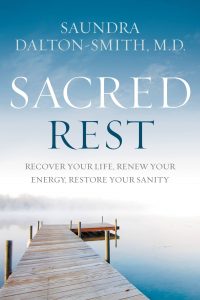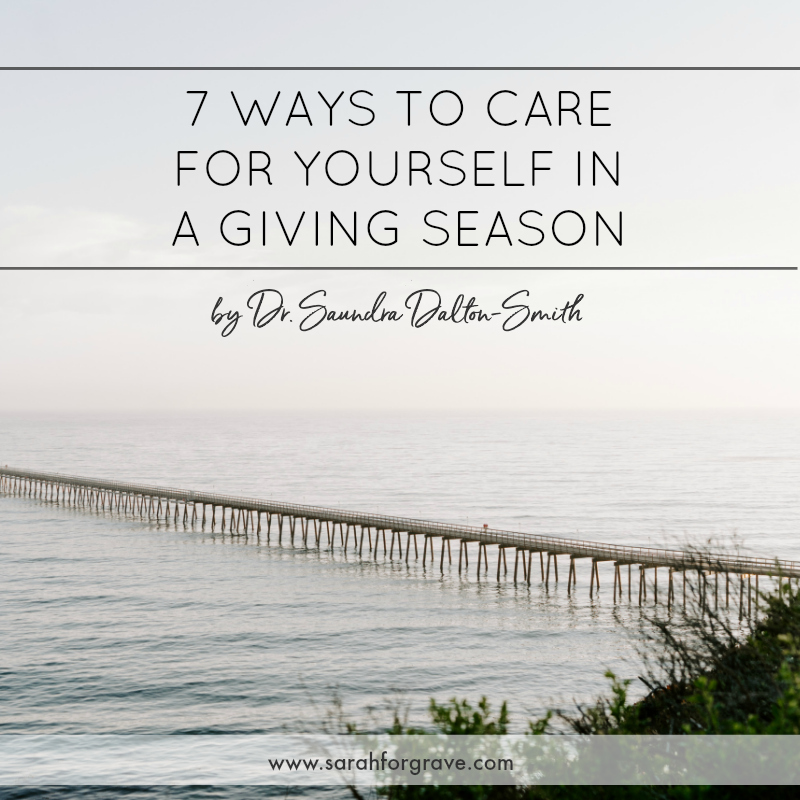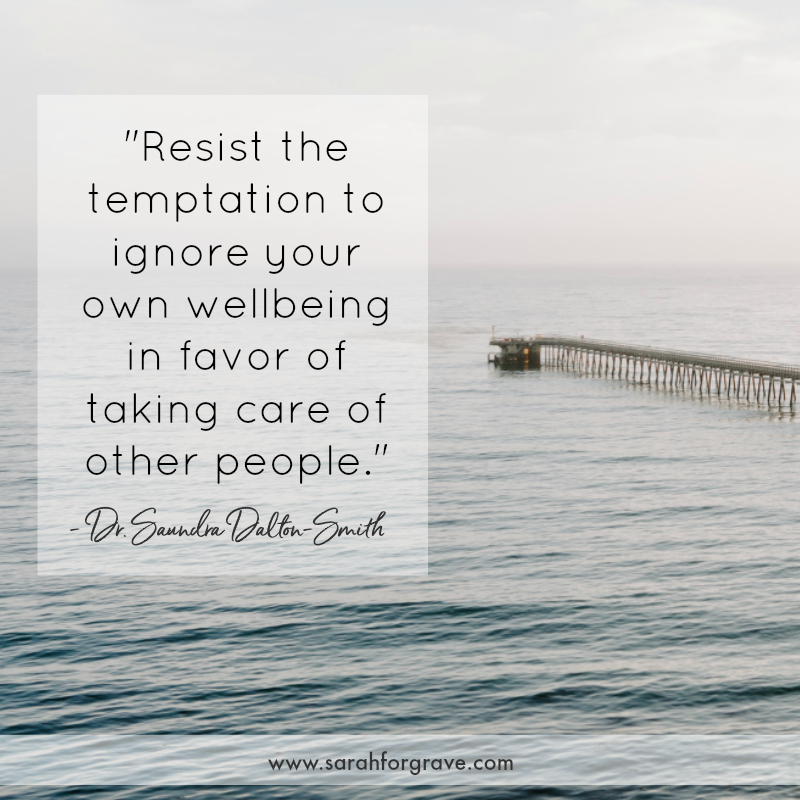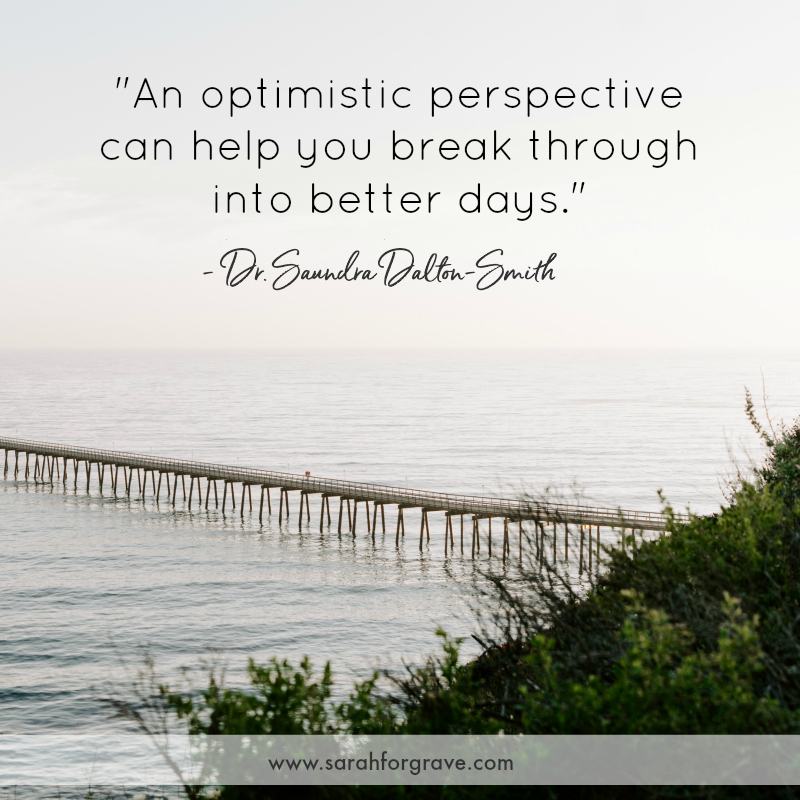When you hear the word rest, what comes to mind? I usually think of sleep or sitting in front of the TV and vegging out on Hallmark movies. Sadly, in seasons of caring for someone else, those moments are few and far between.
But what if we could get the restorative rest we need, even in the midst of stressful seasons? My guest today has a unique perspective that could change your life, whether you’re a caregiver or you’re simply keeping up with everyday demands. Dr. Saundra Dalton-Smith’s book, Sacred Rest, is one of my favorites on this topic, and she’s sharing practical tools to help you rest well.
Here’s Saundra…
Being a caregiver can take on many forms from caring for children to assisting elderly parents and supporting a critically ill family member. It’s an important job to be responsible for another’s needs, but there are many ways you can become depleted in the process.
Within a few hours of caring for someone, you will use physical, mental, emotional, spiritual, social, sensory, and creative energy. Each activity drawing from a different energy pool. After pouring out in these areas, it’s necessary to allow time to be poured into. Rest leads to restoration of your energy stores in preparation for the next time they will be called upon. Omit any one of the seven types of rest, and you’ll feel the consequences of the resulting rest deficit in that area.
Resist the temptation to ignore your own wellbeing in favor of taking care of other people. This can lead to serious personal health problems and interfere with your ability to perform your caregiving role.
Although there is no one-size-fits-all cure for caregiver burnout, there are a number of things you can do to ensure you’re getting the rest you need. Start by taking the free rest assessment at RestQuiz.com then try some of these simple restful ways to care for yourself when caring for others.
Emotional Rest
Stop worrying about what other people think. The time and energy spent in this area are best used to build relationships with people you enjoy and who enjoy you.
Physical Rest
Rediscover the joy of using your body for something other than work. If you’ve completely forgotten how, spend some time watching a young child play. The freedom found in play is as needed in adulthood as in childhood, some would even argue more so. Don’t let responsibilities edge out the liberty to enjoy something just because it makes you smile.
Sensory Rest
Unplug from the endless flux of sensory input around you. Determine what noises, smells, and sights cause you to feel anxious or irritable during the day. Eliminate as much of these sensory stimuli as possible. Dim your screen or the lights in your home. Use earplugs to quiet your surroundings. Make the needed interventions to take back control over what goes into your body via your senses.
Mental Rest
Refuse to allow your mind to dwell on the negative. The mind always wants to go down the path of least resistance. Instead of letting it pull you down that path, put up instant roadblocks and redirect your thoughts back to things which cause you to feel happy and hopeful. Even in the midst of difficult situations, an optimistic perspective can help you break through into better days.
Social Rest
Purposefully connect with people who increase your capacity to love boldly, laugh openly, or live fully. These people will help remind you to live in the moment and will happily bring you into their moments. Use video chat as a way to stay connected when you can’t visit in person. Who do you need to schedule a virtual coffee date with today?
Spiritual Rest
Determine what you believe about God and why you believe what you do. If your beliefs are based on family traditions, risk exploring truth for yourself. Seek out your own spiritual journey to determine who God is to you. Open up the pages of the Bible and walk through each story as one seeking not to simply learn but to encounter God in the pages.
Creative Rest
When is the last time you were awestruck? Awe and wonder should be a regular part of your life. They keep you open to experience and enjoy the beauty present in your day. They create an expectation of goodness. They move you from existing to enjoying. Fill your space with beauty. Fresh flowers, pictures of nature scenes, and soothing music are all simple ways to appreciate beauty in your day.
About Saundra
 Dr. Saundra Dalton-Smith is a Board-Certified internal medicine physician and author. Her newest book is Sacred Rest: Recover Your Life, Renew Your Energy, Restore Your Sanity, including ground-breaking insight on the seven types of rest needed to optimize your productivity, increase your overall happiness, overcome burnout, and live your best life. Connect with Saundra on her website: www.ichoosemybestlife.com.
Dr. Saundra Dalton-Smith is a Board-Certified internal medicine physician and author. Her newest book is Sacred Rest: Recover Your Life, Renew Your Energy, Restore Your Sanity, including ground-breaking insight on the seven types of rest needed to optimize your productivity, increase your overall happiness, overcome burnout, and live your best life. Connect with Saundra on her website: www.ichoosemybestlife.com.
About Sacred Rest
 How can you keep your energy, happiness, creativity, and relationships fresh and thriving in the midst of never-ending family demands, career pressures, and the stress of everyday life? In Sacred Rest, Dr. Saundra Dalton-Smith, a board-certified internal medicine doctor, reveals why rest can no longer remain optional.
How can you keep your energy, happiness, creativity, and relationships fresh and thriving in the midst of never-ending family demands, career pressures, and the stress of everyday life? In Sacred Rest, Dr. Saundra Dalton-Smith, a board-certified internal medicine doctor, reveals why rest can no longer remain optional.
Dr. Dalton-Smith shares seven types of rest she has found lacking in the lives of those she encounters in her clinical practice and research — physical, mental, spiritual, emotional, sensory, social, creative — and why a deficiency in any one of these types of rest can have unfavorable effects on your health, happiness, relationships, creativity, and productivity. Sacred Rest combines the science of rest, the spirituality of rest, the gifts of rest, and the resulting fruit of rest. It shows rest as something sacred, valuable, and worthy of our respect.
By combining scientific research with personal stories, spiritual insight, and practical next steps, Sacred Rest gives the weary permission to embrace rest, set boundaries, and seek sanctuary without any guilt, shame, or fear.



